中职英语基础模块上册第三单元课文
基础模块上册课文翻译
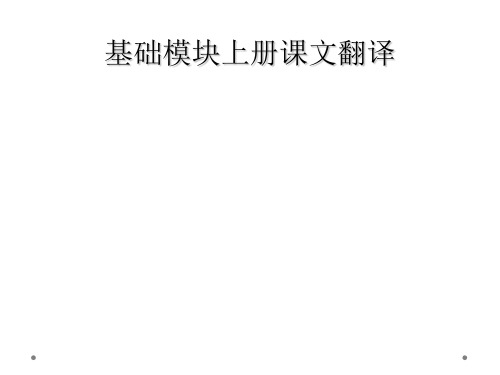
Unit 8 生活公平吗?
一天,我的一个朋友问我一个问题:“你赞同生活是公 平的吗?”他的问题很好。这让我想起了我还是高中生的时 候一位老师说的话---生活是不公平的。我们经常认为生活应 该是公平的,但是有时我们自己觉得很遗憾。实际上,生活 不是公平的,将来也不会公平。
生活充满了挑战。学校是当今青年人生活中最有挑战性 的地方。当我们说生活是不公平的,意思是我们每个人都是 有区别的。我们长相不一样,又不一样的经历。我们不能期 待生活是完美的,生活是我们自己创造的。
黑屏。我问她:“你们的人都在做些什么呢?”
“我们把你们的行程信息输入电脑,然后它会告诉我们 你们是否能搭乘这班飞机。”
“因此如果电脑不工作了,你们也就不工作了?”
Unit 7 黑屏
“是的,先生。” “电脑会死机多久呢?”我想知道。 “对不起,我不知道。有时候可能会十分钟,有时候可 能持续两个小时。不查询电脑我没法知道。但是现在电脑死 机了,它回答不了我。” “近几个小时有没有其他飞往巴黎的航班?” “对不起,我不知道。”她指着黑屏说:“只有电脑知 道。它现在不能告诉我,所以我也不能马上回答你。” 我该怎么办?我遇到了麻烦。很明显,麻烦并非来自电 脑本身,而是操作电脑的人。
至今,他的故事已经流传了2000多年。
Unit 10 马拉松精神
19世纪末,当第一届奥林匹克运动会在雅典举行时,人
们一直在寻找一项重大的项目来纪念古代希腊的荣耀。一个
马拉松赛跑的想法被人们提出。这是一项长距离的田径比赛
---全长26.2英里或者42.195千米。现在,在每四年一次的奥
林匹克运动会中,马拉松已经成为一项重要的赛事。
Unit 7 黑屏
电脑有时候会让你陷入困境,英语里的可怕说法是“电 脑死机了。”日常生活中越来越常听见这句话。一天,我 正在飞机场等着买去巴黎的票,这时订票处的漂亮女孩说: “对不起,我不能卖给你票了,我们的电脑坏了。”
中职英语职业模块 unit03

英语(工科类)(职业模块)
n.
照相机
n.
图像;影像
n.
装置;设备
adj. 移动的
v.
允许
n.
因特网;国际互联网
adj. 原始的;未处理的
n. (datum的复数)数据
19
Unit 3 Dealing with Technology
Words and Expressions
technology /tek5nɒlEdVI/
adj.
band
/bAnd/
n.
object
/5ɒbdVIkt/
n.
英语(工科类)(职业模块)
网络;网状系统 起重机 机器人 装配;组装 连续的 传送带 物体;实物
11
Unit 3 Dealing with Technology
Words and Expressions
lift
/lIft/
v.
load
英语(工科类)(职业模块)
17
Unit 3 Dealing with Technology
Text A
What Can You Do with 3G?
Mobile phones allow us to talk on the move. The Internet turns raw data into helpful services that people find easy to use. Now, these two technologies have been brought together to create third generation (3G) mobile services.
在移动中;在进展中 使变成 相比之下 多达;相当于 充分利用 无论;不管
中职英语基础模块修订版(上)unit3ppt课件

S2: Who do you often read with? S1: Mary, my cousin.
Listening and Speaking
3 Listen again and act. 再听录音,根据提示表演对话。
play basketball play football
3 Listen again and act. 再听录音,根据提示表演对话。
do shopping do reading
S1: What do you usually do after school, Amy?
S2: I usually do shopping with my sister. It’s a lot of fun.
Listening and Speaking
5 Read and discuss. 根据示例谈论萨姆的活动。
What is Sam doing at 12:00 at noon? He is having lunch.
Listening and Speaking
5 Read and discuss. 根据示例谈论萨姆的活动。
take a walk
play ping-pong watch TV
take a nap
Listening and Speaking
5 Read and discuss. 根据示例谈论萨姆的活动。
What is Sam doing at 8:00 in the morning? He is having breakfast.
参考译文
midnight:午夜,半夜12点; until midnight:直到午夜。
语文版中职英语基础模块上册unit 3《campus life》ppt课件(3)

*Headmaster, students, headteacher, professor, homework, exam, test
At school /On campus
词missed 现在分词missing
• wish [wɪʃ] • n. 希望;祝福;心愿 • v. 祝愿;渴望;向…致问候语
• with best wishes • 致以美好的祝愿
Module2 My family, my friends and me
Unit5 My friends
第2课时: Listen and say Think and write
• well [wel] • adv. 很好地;充分地;满意地;适当地 • adj. 良好的;健康的;适宜的 • n. 井;源泉 • go well 进展顺利
• usually ['juʒuəli] • adv. 通常,经常 • sometimes ['sʌmtaɪmz] • adv. 有时,间或 • skill [skil] • n. 技能,技巧;本领,技术 • training ['treiniŋ] • n. 训练;培养;瞄准;整枝
• concern [kən'sɜːn] • n. 关系;关心;关心的事 • concern about 对…表示担心/忧虑;使(自
己)关心… • be glad to 高兴,乐意做某事
• I am glad to see you.
• Haidian Vocational School • 海淀职业学校 • 那么呼伦贝尔职业技术学院怎么说? • HuLunBeier Vocational and Technical College • technical ['teknikəl] • adj. 工艺的,科技的;技术上的;专门的
中职英语(高教版版2021)基础模块3Unit4Customer Service课文
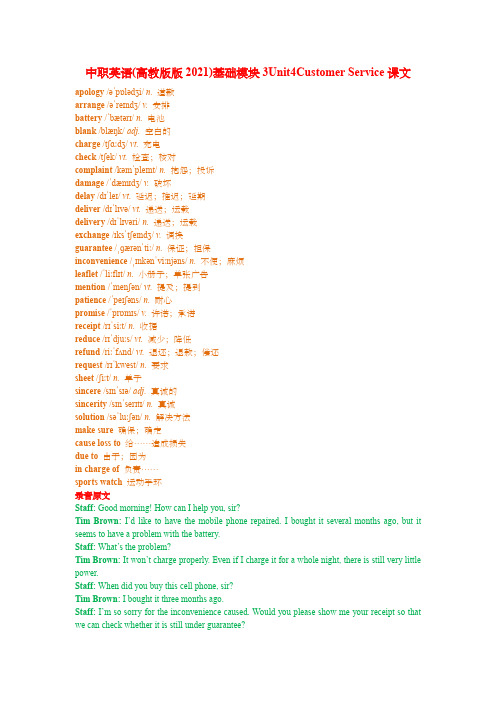
中职英语(高教版版2021)基础模块3Unit4Customer Service课文apology /əˈpɒlədʒi/ n. 道歉arrange /əˈreɪndʒ/ v. 安排battery /ˈbætərɪ/ n. 电池blank /blæŋk/ adj. 空白的charge /tʃɑːdʒ/ vt. 充电check /tʃek/ vt. 检查;核对complaint /kəmˈpleɪnt/ n. 抱怨;投诉damage /ˈdæmɪdʒ/ v. 破坏delay /dɪˈleɪ/ vt. 延迟;推迟;延期deliver /dɪˈlɪvə/ vt. 递送;运载delivery /dɪˈlɪvəri/ n. 递送;运载exchange /ɪksˈtʃeɪndʒ/ v. 调换guarantee /ˌɡærənˈtiː/ n. 保证;担保inconvenience /ˌɪnkənˈviːnjəns/ n. 不便;麻烦leaflet /ˈliːflɪt/ n. 小册子;单张广告mention /ˈmenʃən/ vt.提及;提到patience /ˈpeɪʃəns/ n. 耐心promise /ˈprɒmɪs/ v. 许诺;承诺receipt /rɪˈsiːt/ n. 收据reduce /rɪˈdjuːs/ vt. 减少;降低refund /riːˈfʌnd/ vt. 退还;退款;偿还request /rɪˈkwest/ n. 要求sheet /ʃiːt/ n. 单子sincere /sɪnˈsɪə/ adj. 真诚的sincerity /sɪnˈserɪtɪ/ n. 真诚solution /səˈluːʃən/ n. 解决方法make sure 确保;确定cause loss to 给……造成损失due to 由于;因为in charge of 负责……sports watch 运动手环录音原文Staff: Good morning! How can I help you, sir?Tim Brown: I’d like to have the mobile phone repaired. I bought it several months ago, but it seems to have a problem with the battery.Staff: What’s the problem?Tim Brown: It won’t charge properly. Even if I charge it for a whole night, there is still very little power.Staff: When did you buy this cell phone, sir?Tim Brown: I bought it three months ago.Staff: I’m so sorry for the inconvenience caused. Would you please show me your receipt so that we can check whether it is still under guarantee?Tim Brown: OK. Here you are.Staff: We’ll get your cell phone checked in no time. Please wait a minute.(After half an hour)Staff: Thanks for your patience. We’ve exchanged the battery for you.Tim Brown: Thank you.Staff: It is my pleasure. Please check the phone and sign your name here.参考译文:工作人员:早上好!先生,我能为您做什么?蒂姆·布朗:我想把手机修好。
中职英语基础模块修订版(上)unit3 I like playing badminton第一课时
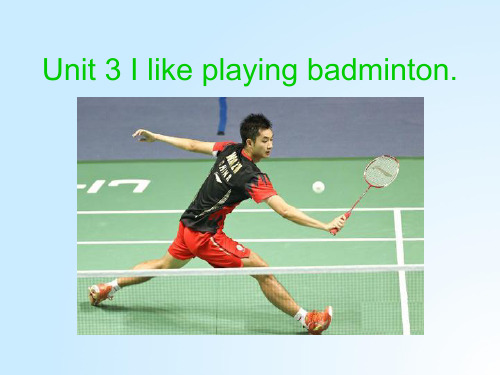
2) 讨论Is it healthy or unhealthy?随机提问
根据P28⑤Read and discuss的内容对学生 进行提问: What is Sam doing at ... ?
3)
运用本节课学习及总结的词组描述自己周末 一天的活动,并评价每个活动healthy or unhealthy。每组派代表发言 Time 10: 00am 12: 00am 1:00pm 3: 00pm 7: 00 pm Activity Having dancing classes Having lunch Taking a nap Playing ping-pong Taking a walk Watching TV
播放第二遍录音。 1)补全文本材料。 Sam: What do you do , Amy? Amy: I usually with my sister. It’s a lot of fun. Sam: Great! But I like . Amy: Who do you often ? Sam: Mary, my cousin. 2) 答案 Usually, after school, play tennis, a lot of fun, playing, pingpong, play with
1)
What sports do you like playing? I like playing… 2) What kind of sports do you often do? I often…
4. New words
Always 总是 Often 常常 Sometimes 有时 Never 从来不 Usually 通常
【语文版】中职英语基础模块上册:Unit 3《Campus Life》ppt课件(3)

• show [ʃəʊ] • vt. 显示;说明;演出;展出 n. 显示;表演;炫耀 • [ 过去式showed 过去分词showed 或 shown
现在分词showing
• show concern about • 对……的关心
help 英[help] • vt. 帮助;补救 • n. 帮助;补救办法;帮忙者;有益的东西 • with the help of • classmate ['klæ smet] • roommate['ruːmmeɪt] ['rummet] • n. 室友
If you hear the following words, where does the dialogue probably take place?
*Headmaster, students, headteacher, professor, homework, exam, test
At school /On campus
• learn [lə:n] • vt. 学习;得知;认识到 • cooking ['kukiŋ] • n. 烹饪 • adj. 烹调用的 • v. 烹调;筹划(cook的ing形式) • cooker ['kukə] • n. 炊具;
• a month ago • 一个月之前 • month [mʌnθ] • n. 月,一个月的时间 • ago [ə'gəʊ] • adv. 以前,以往 • a week ago
spoke 现在分词speaking ]
• understand [ʌndə'stænd] • vt. 理解;懂; • at first起初
• follow ['fɒləʊ] • v. 跟随 • in class 课上 • after class课下 • feel [fiːl] • vt. 感觉;触摸 • [ 过去式felt 过去分词felt 现在分词feeling ]
中职教育-英语(基础模块)上册第三章 Unit3 :Can you dance and sing.ppt

动 词
2) 表示主观上的允许、许可(此时可以与 may 通用,could 更为委婉)
Can I ask you some questions about it? 我可以问你有关这件事的 几个问题吗? Could I be forgiven my negligence? 请原谅我的疏忽,行吗?
3) 表示客观上的可能性
Application for Employment (Sara Smith)
➢ 阅读萨拉·史密斯的求 职表,回答下列问题。
1) How old is Sally? 2) What can Sally do? 3) What position does Sally want to apply for? 4) What’s Sally’s email address?
1. count to___________ 2. 3. 4. 5.
Things I can’t do in English
1. tell jokes___________ 2. 3. 4. 5.
16
过渡页
TRANSITION PAGE
Part 5 Grammar Foucus
Notes
can为情态动词,其否定形式为can’t(也可以写成can not),使用时不随人称变化而
Unit 3 Can you dance and sing?
才艺
目录页
CONTENTS PAGE
Part 1 Part 2 Part 3 Part 4 Part 5 Part 6 Part 7
Warm up Listening and Speaking
Pronunciation Reading and Writing
语文版中职英语(基础模块 上册)Unit 3《Campus Life》ppt课件3

*Headmaster, students, headteacher, professor, homework, exam, test
At school /On campus
• well [wel] • adv. 很好地;充分地;满意地;适当地 • adj. 良好的;健康的;适宜的 • n. 井;源泉 • go well 进展顺利
• usually ['juʒuəli] • adv. 通常,经常 • sometimes ['sʌmtaɪmz] • adv. 有时,间或 • skill [skil] • n. 技能,技巧;本领,技术 • training ['treiniŋ] • n. 训练;培养;瞄准;整枝
• show [ʃəʊ] • vt. 显示;说明;演出;展出
n. 显示;表演;炫耀 • [ 过去式showed 过去分词showed 或 shown 现在分词showing • show concern about • 对……的关心
help 英[help] • vt. 帮助;补救 • n. 帮助;补救办法;帮忙者;有益的东西 • with the help of • classmate ['klæsmet] • roommate['ruːmmeɪt] ['rummet] • n. 室友
• learn [lə:n] • vt. 学习;得知;认识到 • cooking ['kukiŋ] • n. 烹饪 • adj. 烹调用的 • v. 烹调;筹划(cook的ing形式) • cooker ['kukə] • n. 炊具;
中职英语基础模块修订版上unit3教材课件

去游泳
Warming up
play badminton
打羽毛球
Warming up
play basketball
打篮球
Warming up
play ping-pong
打乒乓球
Warming up
go jogging
慢跑
1. Mike plans to go hiking this weekend.
3 Listen again and act. 再听录音,根据提示表演对话。
do shopping do reading
S1: What do you usually do after school, Amy?
S2: I usually do shopping with my sister. It's a lot of fun.
参考译文
莉萨:我喜欢待在家里,看书、看电视、听 音乐。我不喜欢运动和户外活动。
Reading and Writing
3 Read and find. 读下文,了解下列三人各自的问题。
Paula
I often eat hamburgers and drink a lot of coke. I don't like fruits and vegetables.
S2: Who do you often play with? S1: My classmates.
Listening and Speaking
4 Listen and fill. 听录音,补充萨姆周末一天活动的信息。
have breakfast
have dancing classes
have lunch
中职基础模块第三单元

• Pill 药片 dictionary 字典、词典 • Cell phone 手机 disk 光盘 • Cookie 曲奇饼干 grocery 杂货铺 • Bookstore 书店 bakery 面包房 • Supermarket 超市 drugstore 药店 • Department store 百货商店 • Shopping mall 大型购物中心
Expressions:
• At the school gate Have no idea
Good idea Shopping list
在学校门口
不知道
好主意
购物清单
• S:Good afternoon. What can I do for you? • T:I’d like to buy some bananas and oranges. • S:Sorry,there aren’t any bananas. But we have oranges. • T:How much is the orange? • S:2 Yuan a kilo. It’s on sale now. • T:OK.I’ll take 5 kilos. • S:Here you are.
• • • • • •
cookie 曲奇饼干 Cake 蛋糕 Bread 面包
• Dress • 连衣裙
Questions:
where can we buy things mentioned above?
在西方国家drug store 也兼售化妆品、杂质等, 有时译为杂货店
• Shopping mall 是大型 购物中心, 集购物、餐 饮、休闲、 娱乐等为一 体。
• • • • • •
Peng Liyuan:下午打算干啥呀? Song Zuying:不知道。 Peng Liyuan:要不和我去购物吧? Song Zuying:好呀!你想买什么啊? Peng Liyuan:买条裙子。 Song Zuying:我知道一家不错的服装店,那的 衣服都很漂亮。 • Peng Liyuan:太好啦!咱这就去吧!
语文版中职英语(基础模块 上册)Unit 3《Campus Life》ppt课件3

Campus life 校园生活
dormitory
dormitory
canteen/dining hall
playground
library
New Words and Expressions
Greetings n.祝贺,问候 Greetings from Beijing,China. 在中国北京向你问好。 Thank you for为某事而感谢 • Thank you for looking after us so well. • 感谢你们对我们照顾得如此周到。
• show [ʃəʊ] • vt. 显示;说明;演出;展出
n. 显示;表演;炫耀 • [ 过去式showed 过去分词showed 或 shown 现在分词showing • show concern about • 对……的关心
help 英[help] • vt. 帮助;补救 • n. 帮助;补救办法;帮忙者;有益的东西 • with the help of • classmate ['klæsmet] • roommate['ruːmmeɪt] ['rummet] • n. 室友
If you hear the following words, where does the dialogue probably take place?
*Headmaster, students, headteacher, professor, homework, exam, test
At school /On campus
speaking ] • understand [ʌndə'stænd] • vt. 理解;懂; • at first起初
• follow ['fɒləʊ] • v. 跟随 • in class 课上 • after class课下 • feel [fiːl] • vt. 感觉;触摸 • [ 过去式felt 过去分词felt 现在分词feeling ]
中职英语基础模块上册 Unit3 Campus Life
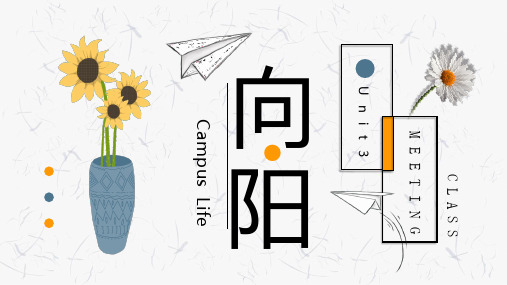
虚词 (意义不完整,不能独立 作句子成分的词)
“名代动→数形副→介冠连感”
friend with
kind adj.和蔼的,亲切的
kindness n.和蔼,友善
be kind to 对……和蔼可亲的
It’s kind of sb. to do sth. ……对某人来说太仁慈了
Eg. (1) The teacher is kind to all of us.
(2) It’s kind ___ me.
The young man always shows off his brand coats.
那个年轻人总是炫耀他的名牌外套
(1) with the help of 在……的帮助下
Eg: With the help of my sister, I finished
my novel.
在我姐姐的帮助下我完成了我的小说
bus
buses
map maps
class classes
potato potatoes
student students
desk desks
woman women
family families
teacher teachers
orange oranges
leaf
leaves
watch watche . city scities . day days . knife knives .
中职英语基础模块上册第三单元课文

A
2
• 动词(v.):表示动作或状态。Jump, eat • 副词(adv.):修饰动词、形容词或其他副词,very, early • 介词(prep.):表示名词或代词与句中其他词的关系。On, with • 连词(conj.):连接词与词、短语与短语或句与句and, but • 感叹词(interj.):表示说话时的喜悦、惊讶等情感,oh,之分。
•
(4)抽象名词。如:love,work,life等。
•
一般不可数,没有单复数之分。
•
2. 专有名词:如:China,Newton,London等。
A
4
• 名词可数名词和不可数名词 • 不可数名词一般没有复数形式, • 如:water---some water , milk---a glass of milk • 可数名词有单数和复数两种形式。
wife ---wives,half--- halves等。
•
(2)直接在词尾加-s,如:roof--- roofs,gulf ---gulfs,chief -
--chiefs,proof ---proofs等。
•
5. 以-o结尾的名词:
A
8
• (1)以“辅音字母+o”结尾的名词后直接加-es,读音为[z]。如:hero heroes,potato potatoes,tomato tomatoes等。
•
其读音为[iz]。
•
如:bus ---buses,box ---boxes,
•
watch ---watches,dish ---dishes等。
A
6
• 3. 以-y结尾的名词:
(1)以“辅音字母+y”结尾的名词,把y改为i再加es,读音为[iz],
中职英语基础模块上册Unit3
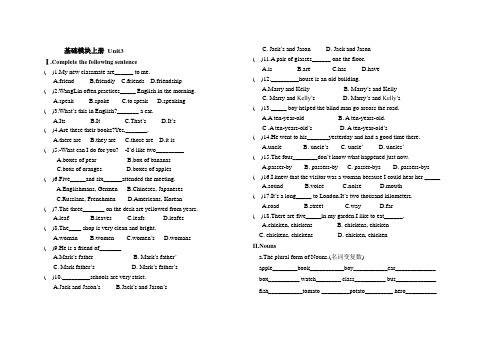
基础模块上册Unit3Ⅰ.Complete the following sentence( )1.My new classmate are______ to me.A.friendB.friendlyC.friendsD.friendship ( )2.WangLin often practices_____ English in the morning.A.speakB.spokeC.to speakD.speaking ( )3.What’s this in English?_______ a car.A.ItsB.ItC.That’sD.It’s( )4.Are these their books?Yes,_______.A.there areB.they areC.those areD.it is( )5.-What can I do for you? -I’d like two_________A.boxes of pearB.box of bananasC.boxs of orangesD.boxes of apples( )6.Five_____and six______attended the meeting.A.Englishmans, GermenB.Chineses, JapanesesC.Russians, FrenchmenD.Americans, Korean ( )7.The three_______ on the desk are yellowed from years.A.leafB.leavesC.leafsD.leafes ( )8.The____ shop is very clean and bright.A.womanB.womenC.women’sD.womans ( )9.He is a friend of_______A.Mark’s fatherB. Mark’s father’C. Mark father’sD. Mark’s father’s ( )10._________schools are very strict.A.Jack and Jason’sB.Jack’s and Jason’sC. Jack’s and JasonD. Jack and Jason( )11.A pair of glasses______ one the floor.A.isB.areC.hasD.have( )12._________house is an old building.A.Marry and KellyB. Marry’s and KellyC. Marry and Kelly’sD. Marry’s and Kelly’s( )13._____ boy helped the blind man go arcoss the road.A.A ten-year-oldB. A ten-years-old.C .A ten-years-old’s D. A ten-year-old’s( )14.He went to his_______yesterday and had a good time there.A.uncleB. uncle’sC. uncle’D. uncles’( )15.The four________don’t know what happened just now.A.passer-byB. passers-byC. passer-bysD. passers-bys ( )16.I knew that the visitor was a woman because I could hear her _____A.soundB.voiceC.noiseD.mouth( )17.It’s a long_____ to London.It’s two thousand kilometers.A.roadB.streetC.wayD.far( )18.There are five_____in my garden.I like to eat______.A.chicken, chickensB. chickens, chickenC. chickens, chickensD. chicken, chickenII.Nounsa.The plural form of Nouns.(名词变复数)apple________book___________boy___________car_____________ box__________ watch________ class__________ bus_____________ fish___________tomato _________potato_________ hero__________photo_________ zoo___________ piano_________ radio___________ family_________ baby__________ factory_________ toy___________ wolf__________ thief__________ wife_________ knife____________ leaf___________ chief_________ serf____________ roof___________ woman _________child_________ foot__________ sheep___________ tooth__________ deer_________ mouse_________ goose___________ looker-on__________________ son-in-low_________________ grown-up_________________ man teacher_________________ Chinese__________________ Englishman_________________b. The possessive case of Nouns(名词所有格)我朋友的自行车__________________学生们的书__________________ 妇女节_________________________ 中国的历史__________________ 他岳母的房子______________________________________露西和莉莉的妈妈__________________________________她爸爸的一个朋友__________________________________他们的两张照片____________________________________两小时的路程_________________ 桌子腿_______________________ III.Translate the following sentences.1.一周前,我来到北京。
最新语文版中职英语(基础模块-上册)Unit-3《Campus-Life》word教案

Unit 3 Campus Life 分课时第3课时教学设计32分钟操练要求学生以小组合作竞赛的形式完成下面的操练,向学生说明竞赛分为三轮,三轮成绩累加,记录团体成绩。
1.第一轮:1)呈现学校建筑照片,引导学生发挥想象描绘图片。
教师适当做句型提示,如:Thisis….There is….Look at…规则:单词,句子描述皆可。
单词描述一次,小组记录1分,句子描述一次,小组记录2分。
(鼓励评价).需要注意的是学生表达不受限。
在学生充分表达之后,教师给出典型句型。
2.第二轮:1)放一遍课文2)知识点回顾学生观看图片,思考,表达。
1.听录音,回忆David的校园生活。
2.明确竞赛规则,团结合作,积极1)充分考虑职教生的基础和接受能力,设计本环节为本节课的高潮部分,通过情境让学生体验语言,让学生模仿和套用。
进行大量操练,在无意识中学习,接受和掌握,是英语教学的一种要求,一种境界,最终实现对语言的交际性运用。
2)小组竞赛在培养抢读,抢译。
抢对一题得1分,和第一轮成绩累加在一起。
3.第三轮:引导学生畅谈校园生活。
1)仿说阶段:呈现一些情景和课文句式,要求学生结合校园生活实际仿说。
句子描述一次,小组记录2分2)自由发挥阶段。
引导学生思考后对校园生活进行补充表达。
学生以小组为单位讨论后发言,难度提升了,所以每参与一次加3分。
4..教师将三轮比赛成绩累加在一起,对学生的参与进行鼓励性评价。
播放职教生活场景照,请学生听一首励志歌曲参与。
学生团结合作和竞争意识的同时,更大程度地提高了学生的课堂参与度。
3)教师的鼓励性评价调动了学生的主观能动性。
6分钟知识技能巩固书信接龙游戏教师说:“歌听完了,同学们是不是更有力量了呢?下面让我们全体同学一起合作做一个书信接龙的游戏吧!每人一句话,完成一封信!像我们的父母或朋友介绍我们的校园生活吧,一起加油,想到了就说!争取不要中断啊Comeon!按照教师提供的书信格式说下去。
从上一环节的说句子过渡到本环节接句子,对学生提出了更高的要求,符合学生的认知规律,并增强了趣味性。
- 1、下载文档前请自行甄别文档内容的完整性,平台不提供额外的编辑、内容补充、找答案等附加服务。
- 2、"仅部分预览"的文档,不可在线预览部分如存在完整性等问题,可反馈申请退款(可完整预览的文档不适用该条件!)。
- 3、如文档侵犯您的权益,请联系客服反馈,我们会尽快为您处理(人工客服工作时间:9:00-18:30)。
• 一、名词的分类
• • • • • • • • • • • 名词可分为普通名词和专有名词两大类。 1. 普通名词又可分为: (1)个体名词。如:cup,desk,student等。 一般可数,有单复数形式。 (2)集体名词。如:class,team,family等。 一般可数,有单复数形式。 (3)物质名词。如:rice,water,cotton等。 一般不可数,没有单复数之分。 (4)抽象名词。如:love,work,life等。 一般不可数,没有单复数之分。 2. 专有名词:如:China,Newton,London等。
• 动词(v.):表示动作或状态。Jump, eat • 副词(adv.):修饰动词、形容词或其他副词,very, early • 介词(prep.):表示名词或代词与句中其他词的关 系。On, with • 连词(conj.):连接词与词、短语与短语或句与句 and, but • 感叹词(interj.):表示说话时的喜悦、惊讶等情感, oh, well
• (1)以“辅音字母+o”结尾的名词后直接加-es,读音为 [z]。如:hero heroes,potato potatoes,tomato tomatoes等。 • (二)不规则名词的复数形式 • 1. 改变单数名词中的元音字母或其他形式。如: man men,woman women,tooth teeth,foot feet, mouse mice,child children等。 • 2. 单复数形式相同。如:sheep,deer,fish等,以 及由汉语音译表示度量、币制等单位的名词。如:yuan. 另外以-ese或-ss结尾的表示民族的名词也一样同形。如: Chinese,Japanese,Swiss等。 • 以-an结尾或其他形式结尾的表示民族、国家的人 的名词变复数时在词尾加-s.如:Americans,Asians, Russians,Australians,Italians,Germans等。 • 注意:Englishman Englishmen,Frenchman Frenchmen.
Unit3 Campus Life Grammar
• 一、词类 • 名词(n.):表示人或事物的名称。Pen . doctor • 冠词(art.):在名词前帮助说明名词所指的人或 事物。A, an, the • 代词(pron.):代替名词、名词性词语或数词。 Me, what • 形容词(adj.):修饰名词,表示特征。Nice, easy • 数词(num.):表示数量和顺序。Two, tenth
• 名词可数名词和不可数名词 • 不可数名词一般没有复数形式, • 如:water---some water , milk---a glass of milk
• 可数名词有单数和复数两种形式。
•
• (一)可数名词的复数形式的构成规则
• 在英语中,可数名词如果表示的数量为“一 个”,则用其单数形式,若表示的数量为 “一个以上”,则 • 1. 一般情况下在名词的词尾加s,如: • book--- books,pencil ---pencils. • 2. 以-s,-x,-ch,-sh结尾的名词加-es, • 其读音为[iz]。 • 如:bus ---buses,box ---boxes, • watch ---watches,dish ---dishes等。
• 4. 以-f和-fe结尾的名词: • (1)变-f或-fe为v再加-es,读音为 [vz]。如:thief--- thieves,wife ---wives, half--- halves等。 • (2)直接在词尾加-s,如:roof--roofs,gulf ---gulfs,chief ---chiefs,proof --proofs等。 • 5. 以-o结尾的名词:
• (三)几种特殊的复数形式的名词 • 1. 有些表示由两部分构成的东西和部分学科的 名词总以复数的形式出现。如:glasses(眼镜), shorts(短裤),mathematics(数学),physics (物理学),politics(政治学)等。 • 2. 有些复数形式的名词表示特别的意义。如: papers(文件),manners(礼貌),goods(货 物),times(时代),conditions(环境;情况) 等。 • 3. 有些名词在习惯用语中一定要用复数形式。 如:make friends with(与……交朋友),shake hands with(与……握手)等。
• (四)不可数名词 • 1. 物质名词和抽象名词多为不可数名词。如:luggage, milk,rice,soup,water,money,meat等。 • 注意:不可数名词在表示量的时候需要用上适当的量词, 当数词大于1时,量词须变为复数。如:a piece of advice(一条 建议) five pieces of advice(五条建议),a bag of rice(一袋大 米) three bags of rice(三袋大米)。 • 可数名词的量也可以用适当的量词来表达。 • 2. 不可数名词的转化 • (1)物质名词表示种类或具体事物时则成为可数名词。如: glass(玻璃) a glass(一个玻璃杯),tea(茶) two teas(两 杯茶),ice(冰) three ices(三个冰淇淋)。 • (2)抽象名词具体化时也可成为可数名词。如:beauty (美丽) a beauty(一个美人),youth(青春) a youth(一 个青年)。 • (3)表示具体事物的可数名词,用于表示抽象或物质意义 是,便转化为不可数名词。如:a room(一个房间) room(空 间),a chicken(一只小鸡) chicken(鸡肉)。
• 3. 以-y结尾的名词:
(1)以“辅音字母+y”结尾的名词,把y改为i再加 es,读音为[iz], • 如:factory--- factories, • company---companies等。 (2)以“元音字母+y”结尾的名词,或专有名词以 y结尾,直接在词尾加-s,读音为[z]。 如:key key. 复合名词的复数形式: • (1)在词末加-(e)s,如:afternoons, housewives等。 • (2)把主体名词变成复数形式。如: lookers-on(旁观者),passers-by(过路人) 等。 • (3)由man或woman作为第一部分的复 数名词,两个组成部分皆变为复数形式。如: man driver men drivers,woman doctor women doctors等。
